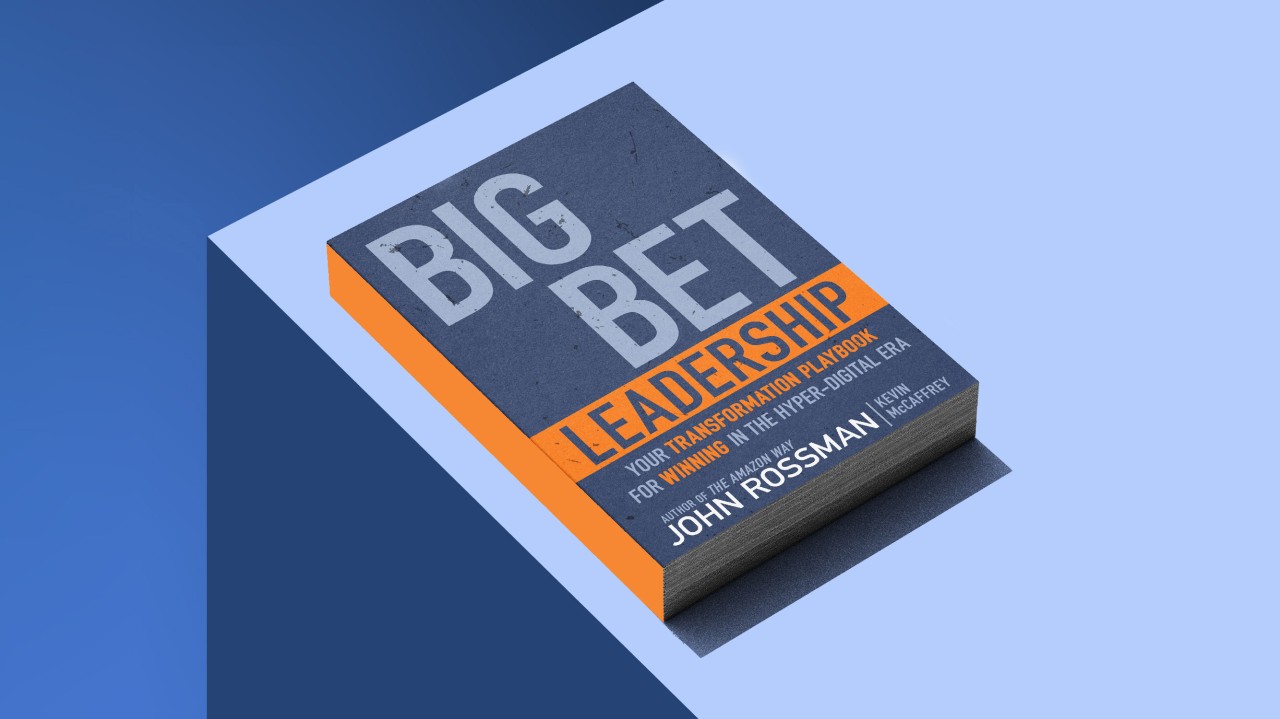Software is eating the world. No longer confined to desktop computers, it’s everywhere we look and A.I. is a component of everything, from our cars to our watches and phones.
But software has always come with risk — and reward for those with the courage of their boldness. In recent history, the most successful companies are those guided by a “Big Bet” leadership philosophy. During my tenure at organizations like
Amazon and
Nubank and under the leadership of visionaries such as Jeff Bezos, Andy Jassy , Jeff Wilke and David Vélez , I have both observed and contributed to the thriving culture that “Big Bets” cultivate.
That makes me pretty qualified to rate the book “Big Bet Leadership” as a guide for those steering digital transformation and change. Both authors – John Rossman and Kevin McCaffrey – are renowned for their leadership during major organizational transformations within large corporations. And while there are a lot of books on the subject, this one distinguishes itself by providing a unique perspective on the challenges of the hyper-digital era.
Core Concepts of Big Bet Leadership
Rossman and McCaffrey write that Big Bets are a far cry from incremental projects, investments or routine business operations. Instead, they are high-stakes, high-potential ventures that entail substantial risk. They stand in sharp contrast to the reform approach, commonly referred to as “transformations,” which frequently falls short of achieving its intended impact. These initiatives often lack the bold character required to propel a business ahead of its competitors significantly.
To leapfrog over rivals, organizations must embrace risk and commit to groundbreaking, daring initiatives that promise not only to change the status quo but to redefine the landscape they operate in entirely.
However, this scenario reveals a critical market gap: senior leadership often struggles to execute Big Bets, despite the growing necessity to take calculated risks in today’s business environment. This reality underscores the need for a revamped leadership playbook — one that navigates the high stakes and transformative potential of Big Bets.
Practical Tools and Strategies
One of the things I most appreciate about this book is its practical, actionable strategies that executives can implement immediately. This step-by-step approach will help industry leaders drive transformations within their organizations with many aspects familiar from my past ways of working.
It also includes access to tools to implement the concepts. These include a Big Bet Journal, Big Bet GPT, and a Gen AI prompt sheet, all available for free at
www.bigbetleadership.com.
What do Big Bets look like in practice? The authors use their experience at major industry players like
Amazon,
Google ,
Bill & Melinda Gates Foundation , and
T-Mobile to draw out some of the lessons of this philosophy. They also show how it can become a core competency for those willing to disrupt the old business rules in their industry.
Real-World Applications and Case Studies
Take the case of T-Mobile, which until 2013 was the fourth-largest carrier in the United States and had been struggling to compete with giants like Verizon, AT&T, and Sprint. It was lagging behind both in terms of reliability or customer perception. Enter
John Legere, who was appointed CEO in 2012.
During a keynote presentation at the Consumer Electronics Conference the following year, Legere announced a bold new strategic shift. From that moment on, T-Mobile’s would tackle the competition with a new promise — “No Contracts. No Data Plan. No Overages” — and a new identity. “We are the Un-carrier!”, Legere proudly announced. As a result, T-Mobile went on to add at least a million subscribers for 20 consecutive quarters, giving the once-troubled carrier a new lease on life.
But gambles come with their downsides, too. In 2015, GE sought to trailblaze the “Internet of Things” sector with its launch of Predix. The brand-new software was meant to become the industry leader in connecting machines to operations and algorithms. The only problem? This $7 billion software was not thoroughly market-tested or proven in real business settings and fell wildly short of its revenue goals. As a result of ventures like Predix and so many others, investors are increasingly concerned about proof of concept work before shelling out capital.
I’ve seen this so many times watching and helping leaders take the big bets to create the world’s largest marketplaces, the invention of cloud services, and the revolution of digital finance and digital currencies. The road to success is littered with failures but leaders that methodically inspire and nurture those big bets can change the world.
Critical Reception and Impact
For many top executives and decision-makers, “Big Bet Leadership” serves as a source of inspiration and motivation. It encourages them to think boldly and take decisive actions to drive change in their organizations. While leaders should never need permission to make difficult decisions, this book can provide much-needed encouragement.
It doesn’t stop at theory either. Readers appreciate the concrete takeaways on how they can position themselves for the opportunity to bet big by first consistently making small bets. The practical nature of advice on how to create this culture and mindset ensures that it will have a tangible impact on their leadership practices.
However, no book on big bets will ever be perfect. Some reviewers note that it focuses heavily on success stories and may not adequately address the challenges and failures that come with transformational leadership. While that’s fair, sometimes it is the jeopardy of high-risk, high-reward that beckons leaders to the startup world in the first place.
As Rossman notes, this presents
a paradox in today’s environment: “[W]e know that the vast majority of these big bets fail, but yet, we have to do more of them.” That’s why “Big Bet Leadership” is the right book for this time of near-constant disruption. The winners will be those willing to embrace the chaos and uncertainty as an opportunity — and in that Rossman and McCaffrey have proved themselves worthy guides.
Learn more about John Rossman at
www.johnrossman.com and
www.bigbetleadership.com 